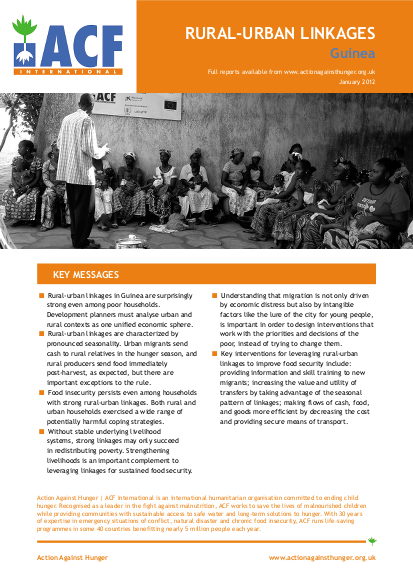
Rural-urban linkages in Guinea are surprisingly strong even among poor households. Development planners must analyse urban and rural contexts as one unified economic sphere. ? Rural-urban linkages are characterized by pronounced seasonality. Urban migrants send cash to rural relatives in the hunger season, and rural producers send food immediately post-harvest, as expected, but there are important exceptions to the rule. ? Food insecurity persists even among households with strong rural-urban linkages. Both rural and urban households exercised a wide range of potentially harmful coping strategies. ? Without stable underlying livelihood systems, strong linkages may only succeed in redistributing poverty. Strengthening livelihoods is an important complement to leveraging linkages for sustained food security. ? Understanding that migration is not only driven by economic distress but also by intangible factors like the lure of the city for young people, is important in order to design interventions that work with the priorities and decisions of the poor, instead of trying to change them. ? Key interventions for leveraging rural-urban linkages to improve food security include: providing information and skill training to new migrants; increasing the value and utility of transfers by taking advantage of the seasonal pattern of linkages; making flows of cash, food, and goods more efficient by decreasing the cost and providing secure means of transport.
Resource collections
- UN Habitat - Urban Response Collection
- Urban Response - Urban Crisis Preparedness and Risk Reduction
- Urban Response Collection - Community Engagement and Social Cohesion
- Urban Response Collection - Economic Recovery
- Urban Response Collection - Environment and Climate Change
- Urban Response Collection - Housing, Land and Property
- Urban Response Collection - Urban Crisis Response, Recovery and Reconstruction
- Urban Response Collection - Urban Resilience